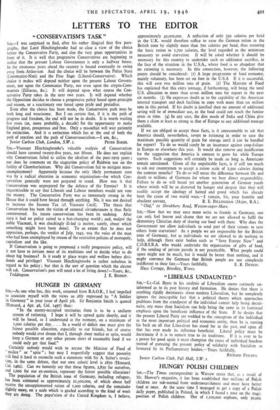HUNGER IN GERMANY
SIR,—As one who has, this week, returned from B.A.O.R., I feel impelled to associate myself with the views so ably expressed by " A Soldier in Germany " in your issue of April 5th. Sir Benjamin Smith is quoted (Hansard, 4 Apr. 46, Col. 1497) thus: " In the enemy-occupied territories there is to be a uniform system of rationing. I hope it will be agreed quite shortly, and it will be based, as I understand at the moment, on a minimum of t,000 calories per day. . . . In a world of deficit one must give the fairest possible allocation, especially to our friends, but of course nobody would ever dream that I, through sheer malice or spite, would keep a German or any other person short of reasonable food if we could only get that food."
Certainly nobody would wish to accuse the Minister of Food of "malice" or " spite " ; but may I respectfully suggest that posterity will find it hard to reconcile such a statement with Sir A. Salter's revela- tion, in the same debate, that our own caloric level is 285o (Hansard, Col. 1462). Can we honestly say that these figures, 2,85o for ourselves, and t,000 for our ex-enemies, represent the fairest possible allocation?
The population of the British zone of Germany, including refugees, has been estimated as approximately 21,5oo,000, of which about half receive the unsupplemented ration of t,000 calories, and the remainder slightly more, on a scale which is graded according to the kind of work they are doing. The popu'ation of the United Kingdom is, I believe, approximately 45,000,000. A reduction of only 35o calories per head in the U.K. would therefore suffice to raise the German ration in the British zone by slightly more than 70o calories per head, thus restoring the basic ration to 1,70o calories, the level regarded as the minimum necessary to avoid starvation. It will be asked whether it should be necessary for this country to undertake such an additional sacrifice, in the face of the situation in the U.S.A., where food is so abundant that no rationing is necessary. In this connection, however, the following points should be considered: (1) A large programme of food economy, mainly voluntary, has been set on foot in the U.S.A If it is successful, this will save two million tons of grain. (2) The Minister of Food has explained that this extra tonnage, if forthcoming, will bring the total U.S. allocation to more than seven million tons for export in the next six months. (3) He expresses doubt as to the capability of the American internal transport and dock facilities to cope with more than six million tons in this period. If his doubt is justified then no amount of additional saving will be of immediate use, as the food could not reach the famine areas in time. (4) In any case, the dire needs of India and China give them a claim at least as strong as that of Europe to any additional tonnage available.
If we are obliged to accept these facts, is it unreasonable to ask that America should, nevertheless, revert to rationing in order to save the maximum possible quantity of grain for storage until it can be handled for export? To do so would surely be an insurance against crop-failure in Europe or elsewhere this year. It would also remove any justification for the suggestion that America is content to grow fat while Europe starves. Such suggestions will certainly be made so long as Americans remain unrationed. Given all the unpalatable facts, is it still too much to ask our countrymen to accept a ration scale of 2,500 calories during the summer months? To do so will mean the difference between life and death to millions of Germans for whom we bear direct responsibility. Failure to do so will breed yet another generation of German youth whose minds will be so distorted by hunger and despair that they will readily accept the ideology of hatred and greed which has already been the cause of two world wars.—I remain, Sir, your humble and






























 Previous page
Previous page